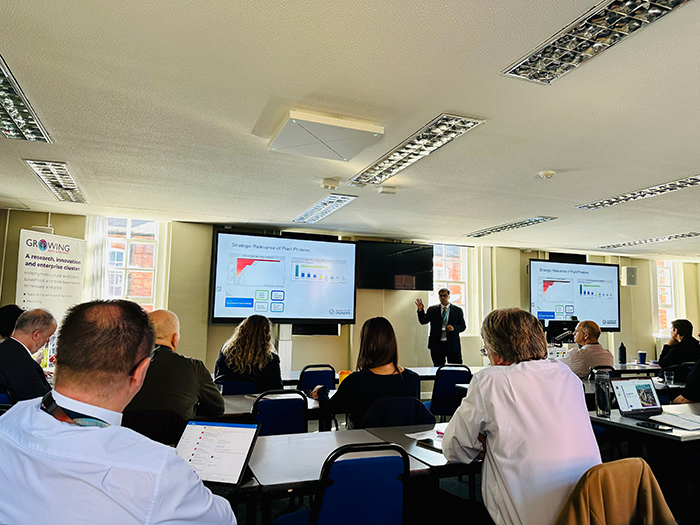NRI recently hosted a Canadian delegation who were in the UK to explore partnership opportunities to advance research and development in alternative proteins. The visit, on 26 September, follows a new partnership between Innovate UK, under the Global Business Innovation Programme, and Protein Industries Canada, announced in June 2023. The partnership aims to strengthen connections across the alternative protein-based food sector to help meet both countries’ sustainability and net zero ambitions. Ultimately, the two countries are working to create more secure and sustainable food supply chains while creating new economic opportunities on both sides of the Atlantic.
During the visit, the delegation discussed opportunities to tap into the growing multi-million-pound plant-based protein industry with experts from our Food Processing and Innovation research group led by Food Innovation and alternative protein specialist, Dr Parag Acharya. They also deliberated on how to address current challenges to plant protein-based food innovation, including unlocking disruptive technologies, future-proofing our supply chains, and strengthening socio-economic drivers.
The new partnership aims to connect innovators across each country’s agri-food sector to establish new collaborations and knowledge exchange opportunities. It will also support companies to access new technologies, ingredients, processes, markets and customers. The focus is on companies involved in product development, value addition, scaling and optimisation of plant-based ingredients, waste stream management and plant-based animal/pet food innovations.
The partnership’s ambitions align with those of Growing Kent & Medway (GKM), an innovation cluster that brings together industry, scientists, technologies and entrepreneurs to stimulate innovation in healthy and sustainable food production. As part of the Growing Kent & Medway project, NRI and partners established the Plant-based Food Accelerator Programme which is hosted at the Medway Food Innovation Centre (MFIC). The Food Accelerator is a 4-month programme of dedicated business and technical support, providing training, tools, mentoring and networking opportunities. ‘We are now looking to develop a Food Innovation Hub fostering partnership and connection with government, investors and innovators. We hope to strengthen the regional ecosystem for food systems transformation, unlock investments and stimulate innovation and entrepreneurship’ said Valerie Pondaven, the Food Accelerator manager. The hub aims to become internationally recognised as a hub of research and development for future food and to attract substantial amounts of investment which will increase overall economic activity in the area.
The MFIC boasts industry-leading expertise, new capabilities in alternative protein, novel processing, sustainable packaging, product development and business support. According to Dr Acharya, the MFIC will not only create a vibrant innovation ecosystem in the region but also deliver next generation low-emission technologies for the alternative protein-based food industry. The centre is a proven success, having supported 65 innovative plant-based food businesses in its first year and securing several research grants from EU and UK Research and Innovation (UKRI).
Dr Acharya said, ‘Alternative proteins are clearly driving a paradigm shift in the global food innovation space through novel agri-tech, advanced manufacturing, and new product development like plant-based meat and dairy alternatives. The alternative protein industry with a current UK market size of approximately £ 1 billion presents a big opportunity for investment with huge growth potential and core technology innovation.’
Plant-based protein is a key area of focus for both the UK and Canada. Having supported successful programs in Canada in the agri-food sector, Innovate UK is looking to build on these, promoting collaboration and partnerships. Bilateral funding opportunities are now being developed to support the plant-based protein sector, with the Global Business Innovation Programme playing a critical role in helping to establish strong collaborations and consortia. Dr Acharya noted, ‘Using the advanced laboratory facilities at MFIC we have been working to understand the underpinning science of novel product and process technologies for plant and algal proteins. UK and Canadian plant protein businesses can thus leverage MFIC capabilities to solve some of their technical challenges by utilising the UK-Canada joint funding call.’
To achieve the country’s net zero by 2050 target, the UK’s independent Committee on Climate Change has recommended a 20% reduction in meat and dairy consumption and a shift to better meat and plant-based alternatives. Similar recommendations are re-echoed by the National Food Strategy, an independent review of the UK’s food system. The review suggests that replacing 22% of animal protein consumption with alternative protein sources like plants, algae or fungi, could reduce greenhouse gas emissions by an additional 3Mt of carbon dioxide equivalent annually. Such a move would also free up 900,000 hectares of farmland.
NRI is proud to be at the forefront of joint efforts to accelerate innovation in plant protein-based ingredients, next generation meat analogues and dairy-free products to create more secure and sustainable food supply chains and unlock economic opportunities in both countries.



